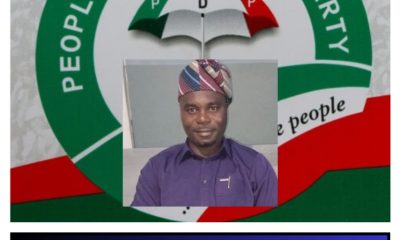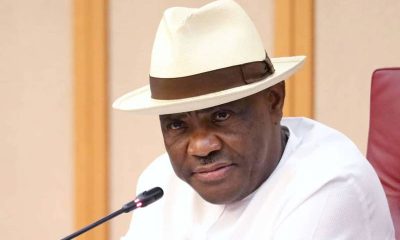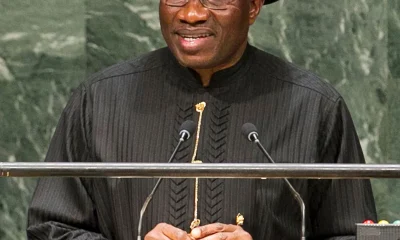Editorial
The Hardship and FG’s Afterthought Of A Palliative Policy”
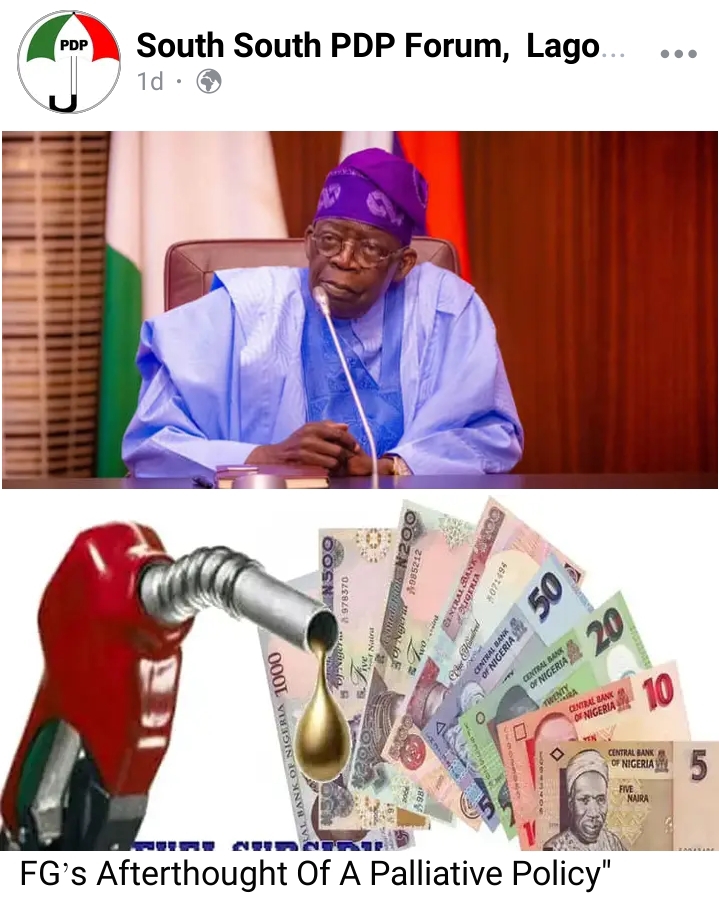
South South PDP Forum Lagos.
The political economics of subsidy withdrawal, announced six weeks ago by the new government of President Bola Ahmed Tinubu on its very first day, continues to stare the government right back in the face, as a massive hike—nearly 300%—in the pump price of petrol ignites corresponding increases in the cost of just about everything else. It will take a while before the full impacts of this policy on jobs, businesses and households are identified and quantified. For now, however, two things are clear.
The first is that there is little room for impulsive decisions in a nation where well more than half of its over 200 million strong population are dirt poor. By President Tinubu’s own admission, the fateful phrase “fuel subsidy is gone” was not even in his prepared inaugural speech, but that he himself “felt it was expedient to stop the subsidy on the first day”. That this admission will come not to Nigerians at home, but in far-away France is instructive in its own right about what publics matter the most to the government.
Be the first to know. Join IduwiniVoice WhatsApp group via https://chat.whatsapp.com/GIesoA9gim9BWKVVCo9Xmo
But the point is that a hurried decision about a complex economic policy issue such as this without much background preparation for what to do next has so far left in its wake far-reaching consequences than the government probably bargained for. We commend the stoic resilience—borne out of hope and goodwill for the government—with which millions of Nigerians are braving consequences of that hurried decision, even this early into its implementation.
Nigerian media are awash with stories about employees who have to give up their jobs altogether; about those who now spend week nights where they work; and about employers and employees in the small and medium enterprises sector who have to choose between job cuts or salary cuts, as all grapple with skyrocketing cost of transportation and its impacts on everything else. Still, more evidence of the consequences of subsidy withdrawal is at hand at the World Bank, which together with the International Monetary Fund (IMF) have, perhaps, been the loudest cheerleaders for this policy in Nigeria.
While still cheering the government’s action in its latest edition of the Nigerian Development Update (NDU), the World Bank nevertheless makes clear that 7.1 million Nigerians risk being plunged into extreme poverty by the end of this year, if urgent steps were not taken by the government. This is rising from the over 4 million Nigerians already pushed into that zone during the first half of the year alone by January’s ruinous naira redesign policy and the early effects of the subsidy removal.
It is also clear the government has little or no idea around what policy measures—palliatives—would help cushion the effects of subsidy removal on Nigerians. First, the government did not announce any palliative measures along with the removal, as is the global best practice for such policies. Second, the President’s letter to the National Assembly requesting the appropriation of N500 billion for “palliatives”, after six grueling weeks, did not provide details of what the measures would be, or how they would be distributed among the target population of the poor across the country.
The absence of details on the government’s N500 billion palliative proposal is also instructive because even the National Assembly’s core business of scrutiny and oversight on such matters require specific details about what the government will do with money and who will gain from it if appropriated. Details matter for transparency and accountability in governance.
Third, the government was supposedly engaging with labour to work out acceptable palliative measures for Nigerians. Yet, both the Nigeria Labour Congress (NLC) and the Trade Union Congress (TUC) have publicly condemned the government’s other palliative proposals, including that of an $800 million loan from the World Bank to be used for cash transfers of N8,000 each to 12 million households in the country over six months.
The government hopes the transfers will “expand coverage of shock responsive safety net support for all vulnerable Nigerians and the cost of meeting basic needs”, ultimately benefitting 60 million Nigerians, in the government’s own estimations. But both NLC and TLC have dismissed them as “laughable” and an “economic waste” given the reach and depth of poverty in Nigeria today.
Clearly for this government, then, palliative measures for subsidy removal are an afterthought. That cannot be. As the government prepares to oversee the disbursement of nearly $1.5 billion dollars (N1.2 trillion) from the two plans combined, the government needs to get the specific details of the palliatives clear and communicate them to Nigerians soon enough. After all, this is a country where even the most well-intentioned public money soon finds itself in private pockets.
Moreover, as the World Bank’s NDU report says, subsidy removal without clear palliatives will mean that “the poor and economically insecure households will face an equivalent income loss of N5,700 per month, and without compensation, an additional 7.1 million people will be pushed into poverty” before this year runs out. We find that scenario unacceptable. Palliative measures for fuel subsidy removal cannot be an afterthought. Palliative policy is part of the moral foundation that binds the citizen to the state in good, or in tough times. The government must get it right quickly, and tell Nigerians about it.
Daily Trust Editorial
Editorial
Is Dubai A Country? Inside the Seven Kingdoms of the United Arab Emirates

By: Editorial Team
The United Arab Emirates (UAE), often hailed as a beacon of modern development in the Middle East, is a federation of seven emirates—each with its own distinct history, ruler, and cultural identity. Since its unification in 1971, the UAE has stood as a rare example of how traditional monarchies can collaborate to build a stable and globally respected nation.
At the heart of the federation lies Abu Dhabi, the capital and largest emirate, known for its vast oil wealth and political influence. The Al Nahyan family, which leads Abu Dhabi, has played a central role in shaping the UAE’s national vision and foreign policy. The current President of the UAE traditionally comes from this emirate, underscoring its leadership within the union.
Dubai, the shining star of the federation, represents ambition and innovation. Under the leadership of the Al Maktoum family, Dubai has transformed from a desert outpost into a global hub for finance, tourism, and technology. Its breathtaking skyline, led by the Burj Khalifa, has become a symbol of Arab progress and resilience.
Moving beyond the two powerhouses, Sharjah distinguishes itself as the cultural and educational capital of the UAE. Led by the Al Qasimi family, it has preserved the emirates’ artistic heritage while promoting academic excellence through its numerous universities and museums.
The smaller emirates-Ajman, Umm Al-Quwain, Ras Al Khaimah, and Fujairah-each add unique character and strength to the federation. Ajman, the smallest, thrives on trade and manufacturing; Umm Al-Quwain offers a peaceful charm along its quiet shores; Ras Al Khaimah, nestled against the Hajar Mountains, is known for its natural beauty and growing industrial base; and Fujairah, facing the Gulf of Oman, plays a strategic maritime role in the region’s economy.
Despite their differences in size and resources, the seven emirates remain bound by shared values, mutual respect, and visionary leadership.Their collective success story reflects not only unity but also the ability to balance tradition with progress.
Over five decades after its founding, the UAE continues to prove that cooperation among monarchies can yield a modern, forward-looking state-one that honors its past while boldly stepping into the future. The federation’s model of governance offers an enduring lesson in leadership, stability, and nation-building in a region often defined by division.
Photo Credit: shuterstock
Editorial
The Modern Avatar of Agadagba

Editorial – IduwiniVoice
Government Oweizide Ekemupolo is 4th Century descendant of The progenitors of the Oru tribe, the archetypal Ijaws, who settled in the central Niger Delta and over time, who developed and spread to the entire Niger Delta. He his an embodiment of the ancient and modern ways and forces of the ijaw ancestral greats, ruled my ancient spiritual and human laws, a man and a superman.
Prior to 1600 AD, the Ijaws first and formally formed city-states on their island of abode in Central Niger Delta. The city-states were named Agadagba-bou, Isomou-bou, and Opugla-bou. The popular city-state was called Agadagba-bou, which, according to history, flourished for 400 years until it got abandoned in 1050 CE. That was the period Ijaw people migrated within the central Niger Delta and spread to the Western and Eastern Niger Delta.
Agadagba-bou, Isomou-bou, and Upugla-bou, which represented the Ijaw civilization at the historical island, long before it was named Wilberforce Island, had cultural, spiritual, linguistic, and occupational homogeneity.
They were all worshippers and believers of the sky God. The sky God that the Ijaws call today, even from ancient times, is Egbesu. It is believed that the Wilberforce Island was known as a forest named after Agadagba, the most powerful chief priest of Egbesu, who also doubled as the military general of the Izon nation.
Agadagba-bou, as a nomenclature, derives its bearing from Agadagba, the chief priest and generalissimo who once reigned on the Wilberforce Island. It is certain that the island hosted the Ijaw nation long before the time of Agadagba because Agadagba was appointed a chief priest and military general during his time by a potentate ruler of Ijaw nation.
In the primordial mists of time, Agadagba, the illustrious military general and chief priest of Egbesu, strode forth from the hallowed grounds of Agadagbabou, his footsteps echoing through the annals of Ijaw history. This revered figure, a paragon of martial prowess and spiritual wisdom, embodied the dual essence of his people, wielding the sword and the sacred staff with equal aplomb. The whispers of the ancients tell us that Agadagba’s reign predated the 1600 AD, a bygone era when the Ijaw nation thrived in harmony with the rhythms of the Niger Delta.
Agadagbabou, the cradle of Ijaw civilization, slumbers beneath the weight of centuries, its sacred soil serving as the final resting place of the ancestral spirits. Here, the venerable dead lie entombed, their ethereal essences lingering, awaiting the supplications of their descendants. Alas, the diaspora of the Ijaw people has occasioned a lamentable disconnection from these archetypal forebears, a severance that has hindered the unfettered flow of ancestral blessings, those numinous benedictions that are the birthright of every society.
For it is an immutable truth that the progress of a people is inextricably linked to the approbation of their ancestors.
The epochs have passed, and Agadagba’s terrestrial sojourn has long since drawn to a close, yet the imperishable essence of this legendary figure endures, awaiting reification in the mortal coil. Behold, 4.18 CENTURIES AFTER AGADAGBA, PRICESELY FOUR CENTURIES PLUS, in this our age, Government Oweizide Ekemupolo, a worthy scion of the Ijaw nation, has arisen, invested with the sacred mantle of Egbesu’s chief priest and military general. The symmetries are striking, the correspondences unmistakable: Ekpemupolo stands forth as the avatar of Agadagba, a reincarnation of the primordial hero, reborn to reclaim the lost patrimony of his people.
As we gaze upon Ekpemupolo, we behold the rekindled flame of Agadagba’s indomitable spirit, a fiery essence that refuses to be extinguished. The mythopoeic imagination whispers secrets in our ear, intimating that this modern-day embodiment of Ijaw valour and spirituality is, in truth, a Priest of the ancient mysteries, a hieratic vessel ordained to restore the pristine glory of Agadagbabou and reestablish the vital link between the living and the ancestral dead.
Thus, the epicycle of time turns full circle, as the reincarnated Agadagba, in the person of Ekpemupolo, strides forth to reclaim his rightful place within the sacred precincts of Ijaw tradition. The word is a witness to his spiritual and endeavours which catalyse a renaissance of the Ijaw spirit, rekindling the ancestral fires that burn bright within the collective unconscious of this venerable people, and guiding them toward a future illuminated by the radiant glow of their archetypal forebears.
As Tompolo’s efforts continue to bear fruit, Nigeria’s economic landscape is transformed, and the nation’s people reap the benefits of his tireless endeavours. His legacy will forever be etched in the annals of Nigerian history, a shining testament to the power of visionary leadership and unwavering dedication to the nation’s progress.
Benedict Binebai is a Professor of African Literature, a Social Conscientizer, and a Critic of outstanding repute.
(c) IduwiniVoice
Editorial
A Magnificent Gesture of Philanthropy: Tompolo’s Landmark Donation 10 Billion Naira to Delta State Government
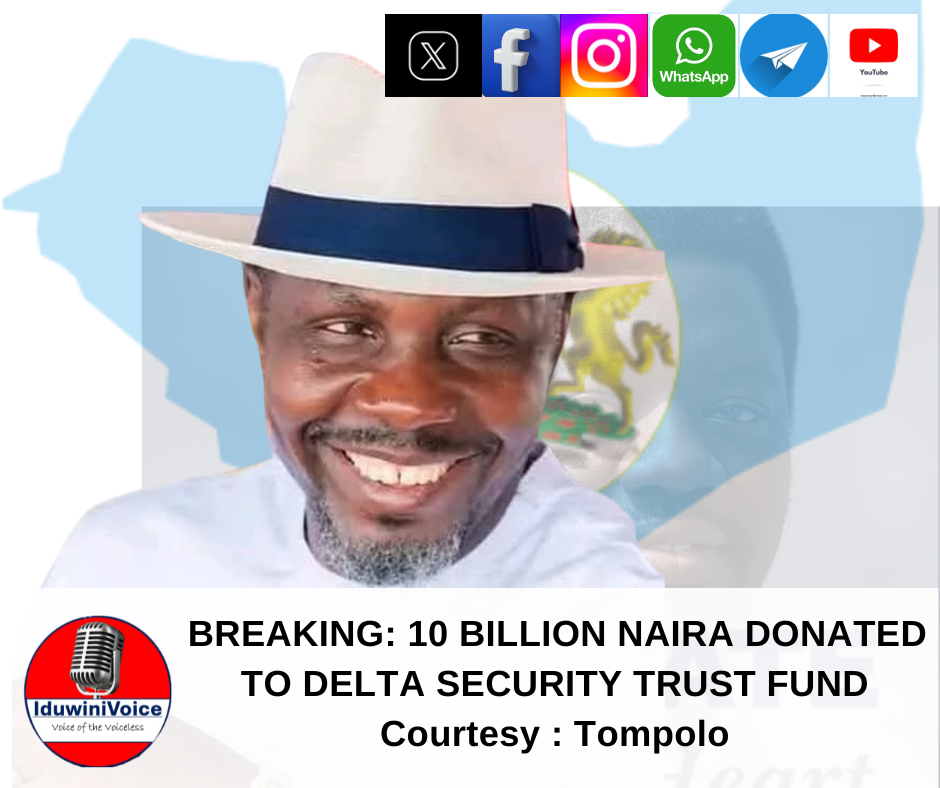
Editorial
Chief Tompolo’s most generous bestowal of 10 billion naira upon the Delta State Security Fund is a magnificent affirmation of his steadfast devotion to the betterment of his beloved homeland. This munificent act not only underscores his profound solicitude for the well-being of the citizenry, but also serves as a sonorous confirmation of his dedication to the edification of the nation.
This magnificent donation bespeaks Chief Tompolo’s perspicacious vision for a Delta State wherein the territorial integrity, individual safety, and proprietary rights of its inhabitants are zealously safeguarded and protected. For it is an immutable truth that security constitutes a fundamental pillar for peaceful and progressive human existence, and a people that get security right are a people who enjoy prosperity, stability, and tranquillity. His largesse constitutes a clarion call to all right-thinking Nigerians to emulate his exemplary conduct, thereby contributing to the realisation of a more stable and prosperous nation.
As a private individual, Chief Tompolo’s remarkable munificence distinguishes him as a true architect of society, a philanthropist of discerning taste, and a stalwart champion of both private and public institutions. His actions evince a profound comprehension of the intricate nexus between security, patriotism, and nation-building, and serve as a shining exemplar for others to follow.
In the pantheon of benevolent figures, Chief Tompolo’s deed resonates with the selfless generosity of mythical beings like Prometheus, who defied the gods to bestow the gift of fire upon humanity, or Hercules, who cleansed the Augean stables to bring prosperity to the land. Like these fabled heroes, Chief Tompolo’s philanthropy emanates a profound sense of altruism, illuminating the path towards a brighter future for the people of Delta State.
By this singular act, Chief Tompolo has floated a most compelling narrative that the Ijaw nation, and indeed all ethnic groups in Nigeria, have a critical role to play in shaping the country’s destiny. His donation is a puissant statement that the resources and talents of Nigerians, regardless of their region or ethnicity, can be harnessed to forge a more united, secure, and prosperous nation, and that the Ijaw people, in particular, are committed to contributing to the construction of a brighter Nigerian picture.
Chief Tompolo’s unprecedented gesture inaugurates a new paradigm of leadership for the Ijaw nation, one that radiates an unparalleled aura of generosity, vision, and selflessness. This luminous exemplar of leadership kindles a guiding light, illuminating a path towards a more prosperous, equitable, and enlightened future for the Ijaw people, and serves as a resplendent model for leaders across Nigeria and beyond, demonstrating that true greatness is measured by the ability to uplift and empower one’s community.
Benedict Binebai is a Professor of African Literature, Public Speaker, and a renowned critic of intellectual acclaim.
(c) IduwiniVoice

